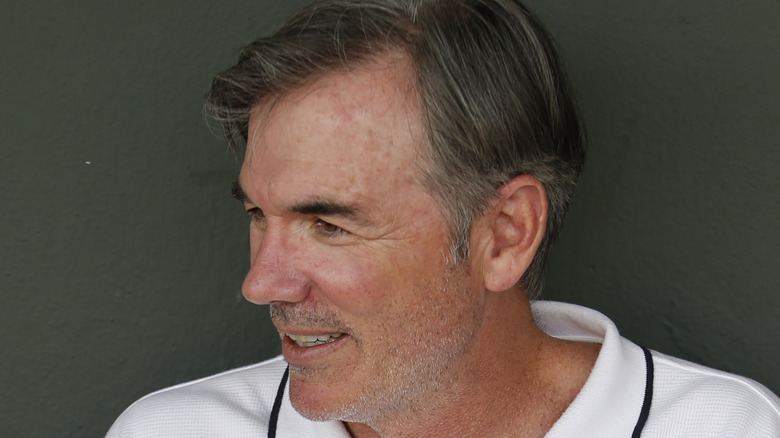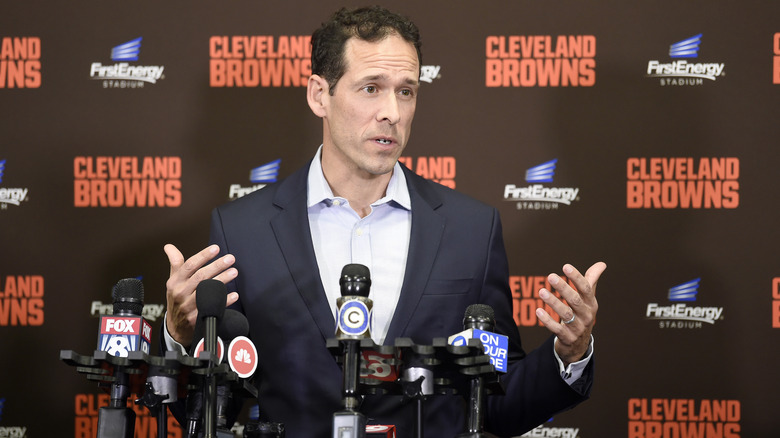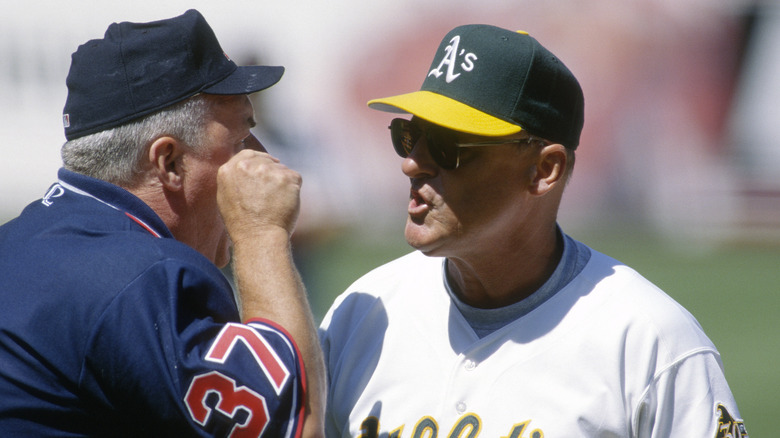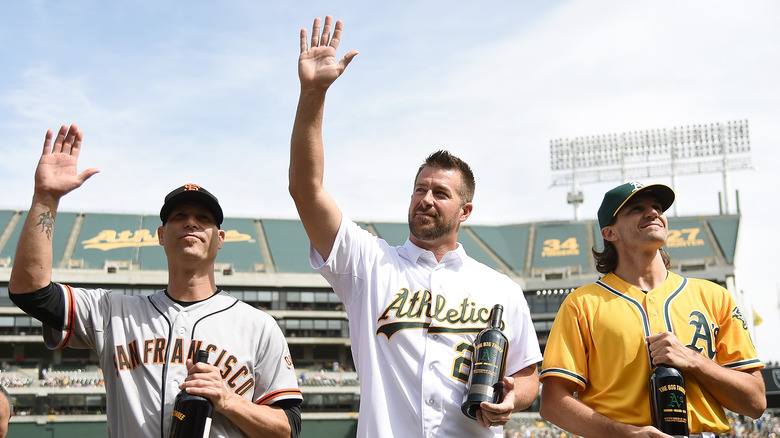The True Story That Inspired Moneyball
When the film "Moneyball" came out in 2011, moviegoers witnessed the true story of one of the greatest sports underdog narratives in recent memory. According to Republic World, the film tells the story of the 2002 Oakland Athletics, who put together an American League record 20-game winning streak. This came after three of the team's star players, Jason Giambi, Jason Isringhausen and Johnny Damon, left the team before the start of the 2002 season.
However, the story does not revolve around the players or coaches, but instead the team's general manager, Billy Beane (above), played by Brad Pitt in the film, and his assistant general manager, Peter Brand, played by Jonah Hill. The duo replaced the star players by using a strategy called "sabermetrics" to find replacement players. As explained by Sportscasting, the reason for the new strategy was Oakland's small budget to pay for players, meaning Beane and Brand had to build a good baseball team without spending a lot of money. The film is based on the book "Moneyball: The Art of Winning an Unfair Game" by Michael Lewis.
The film also features great actors such as Chris Pratt, Robin Wright, and the late Philip Seymour Hoffman. While "Moneyball" saw both critical and commercial success, like any biopic film, a few details were changed or ignored for the big screen.
His name is Paul DePodesta and he was already in Oakland
While it can be understood why some details might be changed, altering the name of a major supporting character was an odd choice. Peter Brand, the meek, unathletic Yale graduate who helped guide Billy Beane to sabermetrics, is actually Paul DePodesta (above), a confident, former Harvard football player, as explained by Sportscasting. DePodesta was not a fan of his portrayal in the film, though he did assist Jonah Hill with his performance. Hill would eventually earn himself an Academy Award nomination.
The film inaccurately stated that Peter Brand was in his first year in Oakland in 2002. In reality, DePodesta had been with the Athletics since 1999. DePodesta would stay in Oakland for five years. In 2004, DePodesta would leave Oakland to become the general manager for the Los Angeles Dodgers. Today, DePodesta is the chief strategy officer for the Cleveland Browns of the National Football League.
Sabermetrics was neither new nor scorned by Oakland's management
In the film, when Billy Beane and Peter Brand first began to build the Oakland Athletics using sabermetrics, they were met with an old guard who mocked and even scorned them. Even Oakland's manager Art Howe and scout Grady Fuson openly challenged Beane's new method, leading to Fuson's firing. However, as Sportscasting explained, Fuson did not leave Oakland in the middle of the 2002 season because of a feud with Beane, but to take a better job with the Texas Rangers. The film also exaggerated or changed aspects of Art Howe's character, Bleacher Report explains.
According to Society for American Baseball Research (SABR), sabermetrics have been applied to in baseball for decades. SABR was founded in 1971. Bill James was one of the 16 original members. James was named in the film and coined the name "sabermetrics" in 1980. Previously, managers like Earl Weaver and Branch Rickey used prototypes of sabermetrics generations before Beane.
Oakland had superstars on their team
While the movie would like to portray the Oakland Athletics as a team of underdogs, the script omits the fact that the team featured some of the best players in all of baseball. As told by Sportscasting, Oakland's shortstop, Miguel Tejada, would be named the American League Most Valuable Player in 2002 and starting pitcher Barry Zito would win the 2002 Cy Young award, given to the best pitcher in the AL.
Zito was just one of three Oakland pitchers who carried the team to success in 2002. Bleacher Report named Tim Hudson, Mark Mulder, and Zito (above, left-right) the second-greatest trio of pitchers since 1990. In fact, the 2001 Oakland Athletics' pitching rotation, led by the three, was named the ninth-greatest pitching rotation in the history of baseball by the MLB Network's "Prime 9" (posted on YouTube). With their talent, the "underdog" Athletics look closer to Richie Rich than Oliver Twist.



